Roger D Launius was NASA's chief historian from 1990 - 2002.His new book The History of Space Exploration chronicles humanity's journey into space, from the first gunpowder rockets to the Apollo missions and the prospect of future space tourism.
BBC Sky at Night Magazine got to chat to Launius about modern spaceflight, the legacy of Apollo and humanity's future in space.
When and where does the history of space exploration begin?
One could say it began with the first successful rockets, and if anyone wants to date it from Sputnik I in 1957 I would not argue.
But humans have long pondered what might be beyond Earth and I tend to push the beginning of space exploration back much farther to the time of the scientific revolution.
When humans first realised that some of those points of light in the night sky might be planets they also began thinking about how they might visit them.
The Moon, of course, was an early and frequent place envisioned for exploration.
Cyrano de Bergerac in the 17th century even wrote a novel about going there.
Could we make the case that space exploration actually begins with realising that there are planets with hard surfaces we might stand on? I think so.
The process of getting there, and surviving there, required centuries more before realisation but humanity has been in it for the long haul.
We sometimes lose track of the truth that space exploration will take centuries. We sometimes get impatient. I know I do.
But there has been remarkable success in my lifetime, and I have every reason to believe it will continue indefinitely after I am gone.
What have been the biggest milestones in the story of space exploration so far?
No question, number one is Apollo. Simply amazing!
It's harder to agree on a number two, three, or four accomplishment. We can debate this endlessly.
Sticking with human spaceflight, I would place the Space Shuttle programme high on the list as well, for many reasons.
For example, throughout its career (1981-2011) the Shuttle served as a versatile platform for scientific inquiry.
While the programme was not conceptualised as a science effort - rather it was a technology demonstrator and workhorse for space access - it was used as an exemplary platform for all manner of microgravity and space science experiments.
Each of its flights has undertaken some scientific experiments ranging from the deployment of important space probes to other planets, through the periodic flights of the European-built Spacelab science module, to a dramatic set of Earth observations over more than 30 years.

Which of the many rocket-powered missions are your favourites?
It's hard not to be enamoured with the Moon landings of the latter 1960s and early 1970s.It was the first time and thus far only time humans have set foot on another body beyond Earth.
I agree with legendary journalist Walter Cronkite who summed it up best in 1998: "Yes, indeed, we are the lucky generation," for we "first broke our earthly bonds and ventured into space.
"From our descendants' perches on other planets or distant space cities, they will look back at our achievement with wonder at our courage and audacity and with appreciation at our accomplishments, which assured the future in which they live."
I count myself among that lucky generation who experienced the Apollo voyages of discovery.
I hope to see a return to the Moon and perhaps a human mission to Mars.
Beyond Apollo, I am endlessly amazed by the voyages of discovery to the outer Solar System.
Pioneers 10 and 11, Voyagers 1 and 2, the Galileo probe to Jupiter, the Cassini/Huygens mission to Saturn, cometary missions, and New Horizons to Pluto and the Kuiper Belt are all fascinating and have rewritten our understanding of the Solar System and its place in the cosmos.
It's impossible not to stand in awe of the wonder of the universe made clearer through these efforts.
Finally, I am astounded by the discoveries on Mars.
Beginning in the 1990s the scientific consensus that Mars was once a watery planet has held profound implications for exploration of the planet.
The Mars exploration strategy 'follow the water' has led to many missions seeking evidence of liquid water on Mars.
Finding it could demonstrate the ubiquity of life in the universe.
The missions undertaken, and the search for water on Mars, may help answer the most profound question ever: "Are we alone in the Universe?"
As we enter into the 50th anniversaries of the Apollo missions, what do you think has been the programme's lasting legacy?
I could say quite a lot on this subject and have a book, Apollo's Legacy: The Space Race in Perspective forthcoming in 2019 that focuses on this very question.
Beyond that, I would suggest that there are several possible legacies of Apollo that require consideration at the 50th anniversary: the rise of a new environmentalism coming from seeing Earth in a new way, technological accomplishment as a standard of excellence, jumpstarting the digital revolution in the 1970s, and a scientific harvest from the Moon landings that transformed our understanding of the Solar System).
Moreover, there is a nostalgia for Apollo that permeates our thinking, a desire to return to a time that seems more understandable and one in which we could set a goal and accomplish it on a schedule that seems impossible today.
The conception of progress that Apollo embodied makes us long for days gone by.
I would ask how might we characterise Neil Armstrong at this point?
Advocates of human space exploration have tended to view him as akin to the fifteenth century Christopher Columbus, the vanguard of sustained human discovery and exploration of the Americas.
But as more time passes, is he more like Leif Erickson and his voyages from Scandinavia several hundred years earlier: an exploratory dead end?
Time will tell.

What are your hopes and expectations for the future of space travel?
I have many but let me focus on one, international human space exploration.
Since 2000, there has been an ongoing human presence in space thanks to the various crews of the International Space Station.
This international project has fostered an unprecedented level of international co-operation in space activities and the goal for future efforts will not just be to maintain this level of presence, but to develop stronger international bonds as we move out farther to the Moon and the planets.
Using a space station as a base camp, humans may well be able to return to the Moon and establish a permanent human presence there.
From the Moon, the next most likely goal would be for an international coalition of nations, corporations and other entities to pursue human exploration of other places in the Solar System.
Possible candidates for such expeditions include various asteroids and the Moons of Jupiter and Saturn.
But the most obvious and closest target would be Mars.
Because of the cost, technological sophistication and broad risk it seems unlikely that any one nation would undertake an expedition to Mars.
An international endeavor spreads the risk, cost, and difficulty; the manner in which the European Space Agency has accomplished most of its successes is an attractive model for such an endeavour.
Perhaps this will be led by the United States but perhaps ESA, China, Russia, or some other nation would take the lead.
All the promise held out for the ISS in gaining scientific knowledge, technological development, and a hopeful future exploring the Solar System may well pale in comparison to the very real possibility of enhancing cross-civilizational relations through its one act of working together to tackle an enormous challenge.
The same may be true of the very real costs involved; it is a small price to pay for better international relations and spending a larger share of the public treasury for international space missions is eminently better than spending it for weapons of destruction.
For all the difficulties involved in working with a large group of international partners, it is quite possible that 100 years hence the most significant aspect of any of human space exploration activity in the 21st century may be that it brought various nations together in a large, peaceful pursuit.
The History of Space Exploration by Roger D Launius is published by Thames & Hudson.

